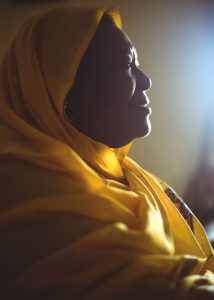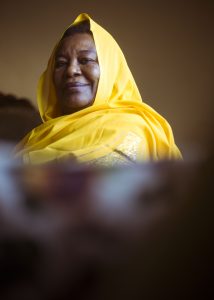A peaceful and prosperous Sudan will not happen without women
In a country where military rule has defined much of the social and political life for decades, Sudanese women have grown up fighting for freedom and justice. Lawyer and activist Afaf Ibrahim Mohamed Arbab wants to see more women involved in the peace negotiations, as well as in the democratic transition. Despite the active efforts of past years, the demands of the Sudanese revolution have not been fulfilled.

Afaf Ibrahim Mohamed Arbab photographed at her home in Khartoum, South Sudan, February 2022 / Aymen Muhammed for CMI
Lawyer and activist Afaf Ibrahim Mohamed Arbab believes that to establish a civilian democratic government in Sudan it is essential to first take the necessary legal measures. This would involve having all the transitional institutions subject to a constitutional conference. Afaf says that the second main goal is to have democratic elections. Afaf became a lawyer when Sudan’s former autocrat Omar al-Bashir took power in a 1989 military coup. Her early years in law were largely defined by the rule of former President Omar al-Bashir’s. During the revolution that ousted al-Bashir, Afaf became a high-ranking lawyer working for freedom and justice for the people. As with most women in Sudan, the political upheavals have strongly influenced the best years of Afaf’s life – for her they have defined her journey from youth to the lawyer she is today.
Women’s rights and equality represent fundamental areas of change as the country emerges from three long decades of political oppression. While the context remains uncertain due to challenges of underdevelopment, inequality, regional instability, and climate change, women in Sudan are determined to change the direction of the country. Having gone through a popular uprising in 2018-2019, which led to the fall of Omar al-Bashir, women have entrenched their role as key players in peace building and democratic transition in both formal and informal activities linked to the national peace process.
While the Draft Constitutional Declaration calling for a peace agreement was signed by military, political parties and civilian representatives in August 2019, many of the demands of the revolution have not been realised. The peace process is yet to be fully completed. In 2021, CMI provided operational support to nine delegates from a major national coalition, Women of Sudanese Civic and Political Groups (MANSAM), to participate in formal peace negotiations between the Government of Sudan and Sudan People’s Liberation Movement-North led by Abdelaziz al-Hilu in Juba as observers and as members of technical committees and working groups. Afaf was a senior member of the delegation, and the only MANSAM representative to sit in the negotiation room. “The work for freedom, justice and peace has never been easy. It is a continuing struggle”, says Afaf.
Peace is the main entry point for freedom and justice
Until recently, women have been considered as second-class citizens in Sudan. Though largely marginalised in politics, women have been fighting for recognition of their abilities and rights. Women have to work twice as hard to be successful in all positions in society.
Afaf says that women in Sudan want to knock down negative perceptions of women. “Undoubtedly, women in Sudancan be successful in all tasks assigned to them. Women here have been fighting for their existence, for the right to vote, and for access – to be skilled in the field they wish”.
In order to support the peace and democratic transition in Sudan, women rely heavily on grassroots involvement. They have mainly been mobilising women in local communities and rural areas to be involved in the constitutional conference, emphasising the need of finding a sustainable basis for the future.
“Peace, as mentioned in the constitutional document, is a priority in the transitional period. Peace is the main entry point for freedom and justice”, Afaf explains.
One of her main concerns now is to spread awareness and to improve the conditions of women in Darfur, the Nuba Mountains and along the Blue Nile, which are still affected by armed conflict resulting from the prolonged civil war that led to South Sudan’s independence in 2011. Through this work, Afaf wants to improve women’s ability to take part in politics and be empowered socially, politically and economically everywhere in society.
But change has been uphill work. Women’s groups are trying to bring messages of change from the grassroots to the top of the political pyramid, the legislative council. To link local communities to the national process, women, particularly in rural areas, need support to strengthen their capacity and knowledge of their political rights. Building the democratic infrastructure begins from the rural communities, and Afaf wants this to be taken into account when preparing for the peace negotiations. “First and foremost, we need peace”, she says.
Breaking down conflict barriers and rebuilding the future
After ousting the former president al-Bashir, Afaf and other women continued to work for a peaceful, democratic Sudan where human rights are enshrined in the constitution and the national law. Afaf believes that Sudan must ensure women’s participation in building its future, and engage women in drafting the permanent constitution for the country. She says that women play a crucial role in resolving disagreements between different political actors and enabling the political process to reach peace and stability. She also wants to see accountability and hopes that anyone who has committed crimes against Sudanese people will be prosecuted.
In March 2020, the Sudanese government established and approved a National Action Plan to implement Security Council Resolution 1325 on women, peace and security, 20 years after it was passed. One of the key goals of the action plan is to abolish all laws that are biased against women. This is an extensive legal reform that will change alllaws that impact women’s freedoms and rights. It’s a positive development, but much remains to be done.

Afaf Ibrahim Mohamed Arbab photographed at her home in Khartoum, South Sudan, February 2022 / Aymen Muhammed for CMI
In addition to the legal reforms, Afaf wants to see more women involved in the peace negotiations, as well as in the democratic transition.
“The peace negotiations reached a very difficult stalemate between the warring parties. This obstructed the negotiations. We as women actors play a role in breaking the ice – in breaking down barriers. We need to have some movement to break the ice between the warring parties and the negotiation parties.”
Afaf says that it’s important to work with women affected by the war in the conflicted zones and disputed areas to make their voices heard.
“I always say that participation in negotiations should not happen in the five-star hotels, around a negotiating table. No – we need to share these events with women in grassroots level. Because they are the ones who pay the price of the war”, she adds. “Women’s contribution is not only a social contribution to reinstate peace. I believe women can help reconstruct the country and its future”.
On the International Women’s Day, Afaf wishes to congratulate all the women in her country and across the world.
“I think women can be the real advocates for peace, to establish real peace in the world”.
Annmarie Kiiskinen / CMI